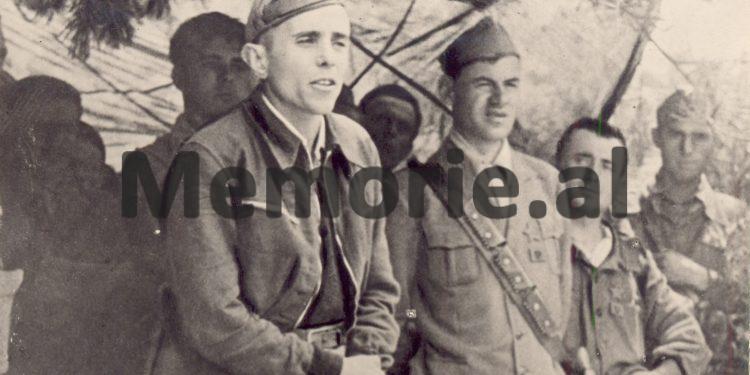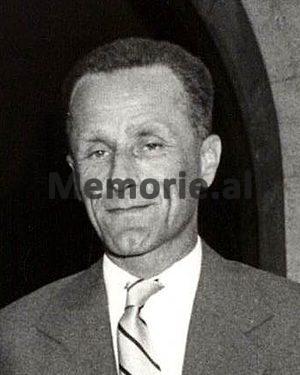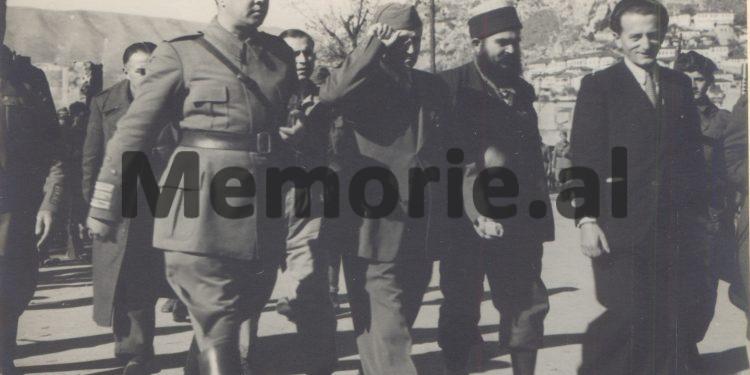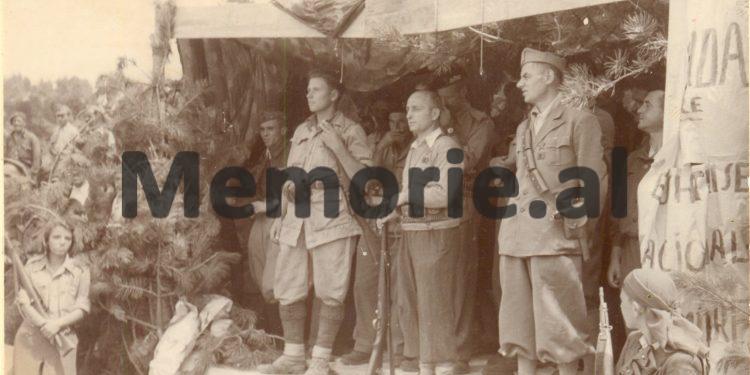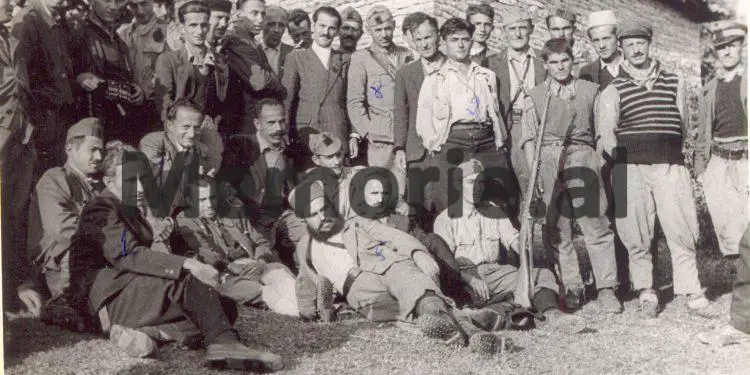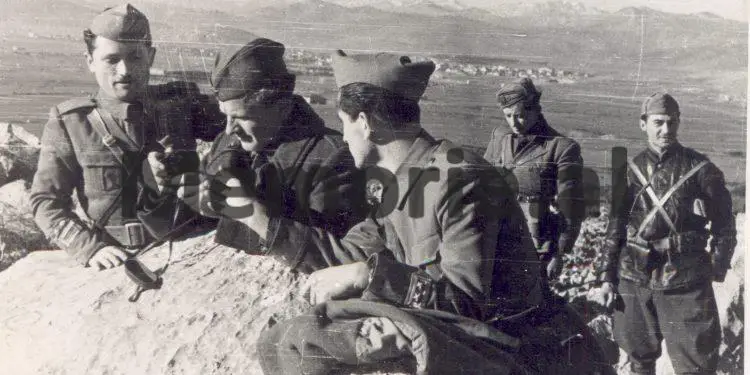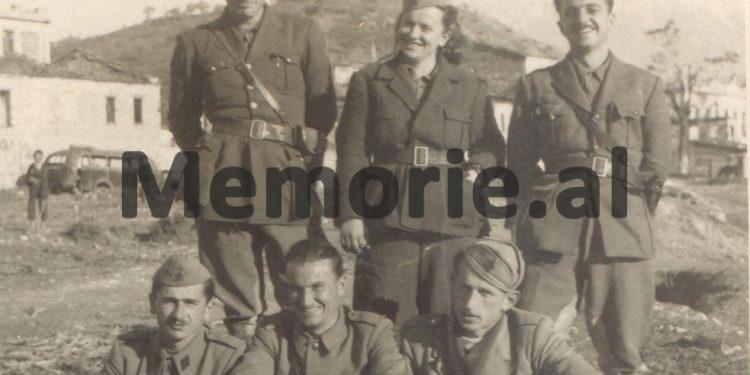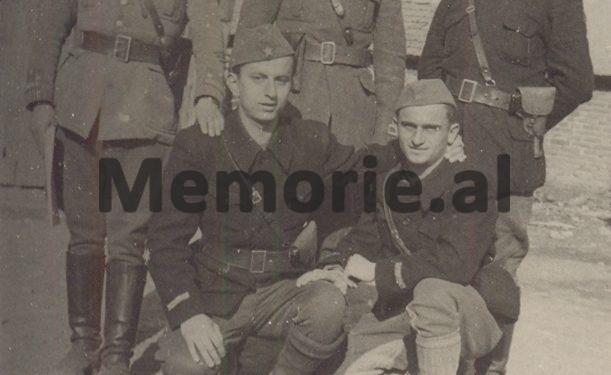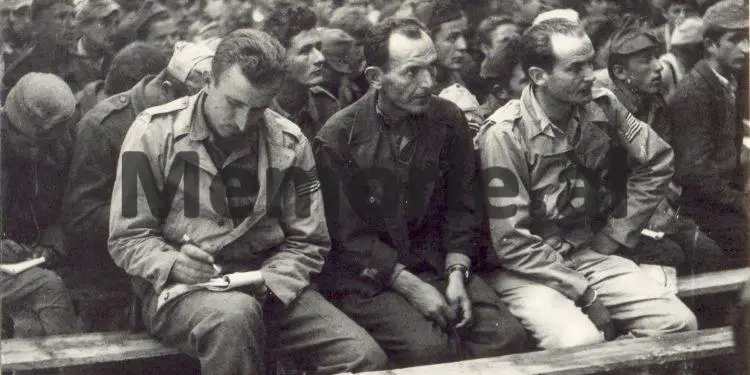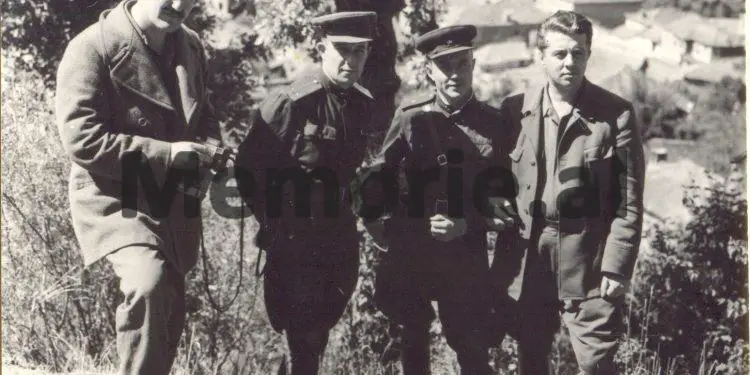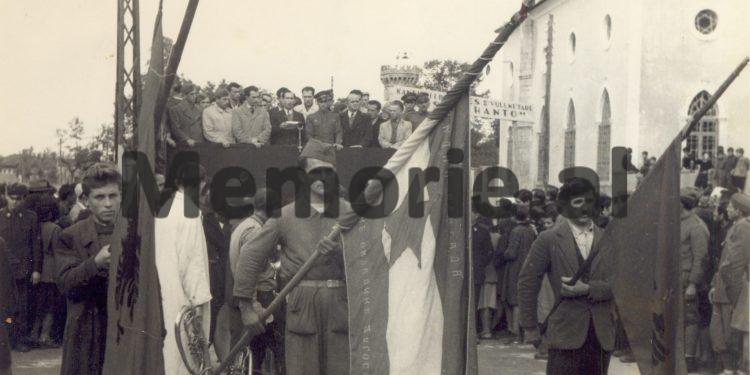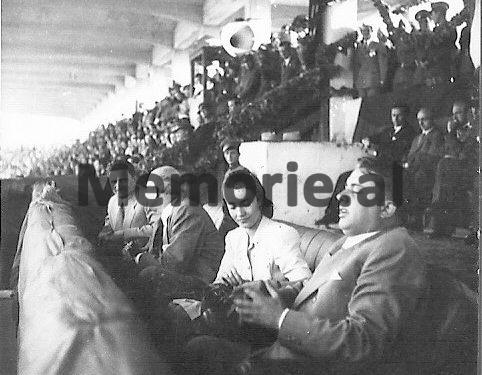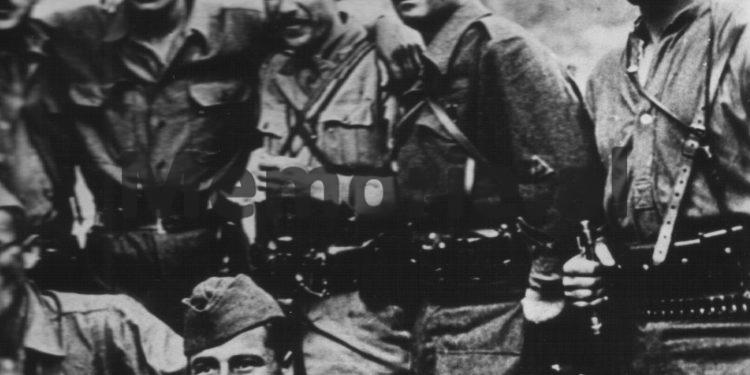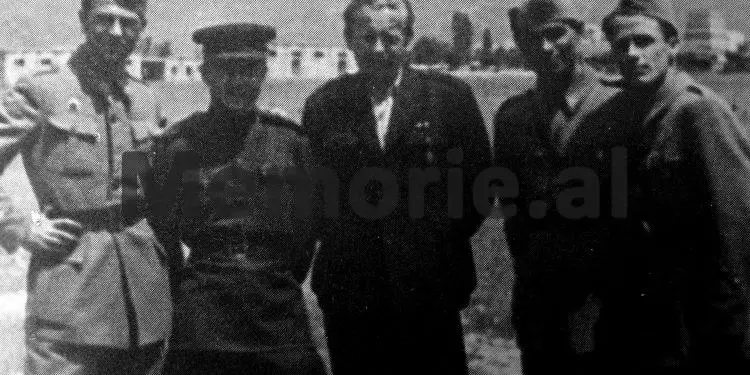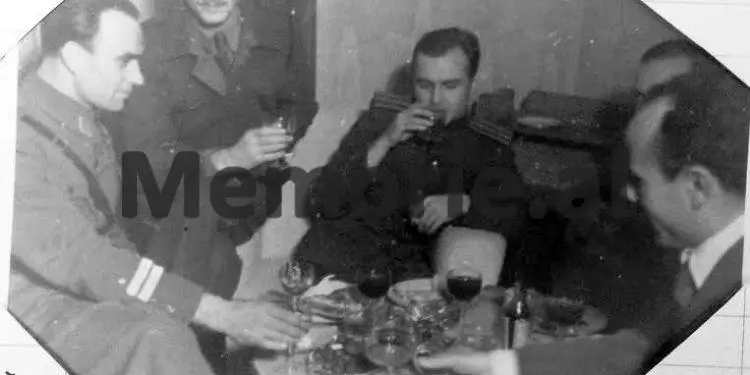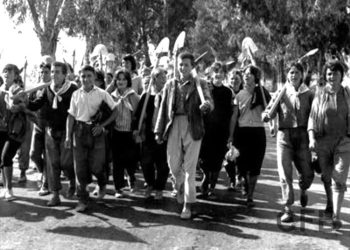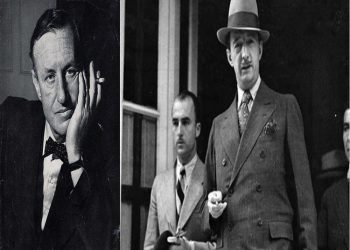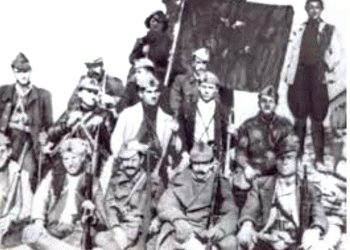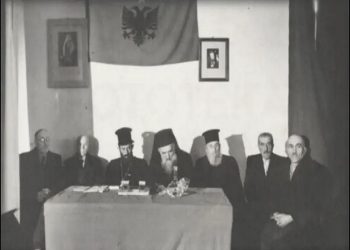Dashnor Kaloçi
Memorie.al/ publishes the unknown memoirs of Njaz Dizdarevic, former chairman of the Communist Youth of Yugoslavia for Bosnia and Herzegovina during World War II and later a member of the Central Committee of the Yugoslav Communist Party, who in 1944 was sent by Josif Broz Tito as his envoy in Albania to Enver Hoxha, as an instructor in charge of youth and army affairs. Rare testimonies of Tito’s missionary published in 1988 in Yugoslavia at that time, regarding the main events of the period of the ‘Anti-Fascist National Liberation War’ in Albania where he himself was a witness, refuting Enver Hoxha for what he had written in the book his, “The Titoists: published in 1982 in Tirana, such as: the shooting of Ramize Gjebre, the Plenum of Berat, the role of Enver throughout the war, his relations with the Yugoslav missionaries and his closest collaborators, as Nako Spiro, Koci Xoxe, Sejfulla Malëshova etc.
First of all, I wanted to say about Enver Hoxha that it is characteristic for him that what he writes in the book “Titists”, does not correspond to the truth and reality of the time in question. Thus, his book is based on general facts, and most do not even deserve much attention and space. He writes at length about the Berat Plenum of the Central Committee of the Communist Party of Albania, which was held in November 1944. Enver Hoxha does not accidentally confuse some facts, some of which are true and some half true. This was done for propaganda purposes that served him for the period when he was writing the book. This Second Plenum of K.Q. of the SNP in Berat, in his book “The Titoists” is given as the main evidence of the interference of the Yugoslavs and the Central Committee of the Communist Party of Yugoslavia in the internal affairs of Albania. “Through this, through unilateral assessments and falsifications, false accusations have been made against us.”
This is what Njaz Dizdarevic, the former chairman of the Yugoslav Communist Youth for Bosnia-Herzegovina during World War II and later a member of the Central Committee of the Yugoslav Communist Party and after the war, wrote in his memoirs. pension) with other high party duties, who in 1944 was sent by Titua as his emissary in Albania (instructor for youth and army affairs), to Enver Hoxha, through his memories sheds light on some of the dark sides of the National Liberation War and the relations of Tito’s envoys with the senior leadership of the SNP and personally, the Commander-in-Chief, Colonel-General Enver Hoxha, whom he accuses of fraud and forgery that he has done to those events that Hoxha wrote them in his lifetime. Who was Enver Hoxha, what was his role and that of the senior leaders of the Albanian Communist party and those of the General Staff of the partisan Army during the years of the War in Albania. These questions shed light on the memories of former Yugoslav high-ranking official and Tito missionary Njaz Dizdarevic (his brother, Rauf Dizdarevic, was Yugoslavia’s foreign minister before its dissolution), who were attached to the leadership of the high communist partisans of Hoxha.
Dizdarevic: How did I come to Albania?
Regarding his arrival in Albania, Njaz Dizdarevic, Tito’s former missionary, recalls: “In early July 1944, I was announced to report to the General Staff of the Yugoslav National Liberation Army in Vis. I was coming here after the Second Congress of the Yugoslav Anti-Fascist Youth Union that took place in Drvar and the second session of ZAVNOBIH, in Podgërmeç. According to the agreement in the provincial committee of the Youth Union of Yugoslavia for Bosnia and Herzegovina, a member of which I was obliged to deal with the provincial organization of the Youth Union of Yugoslavia in Bosnia. My main task was to work with the masses on the decisions of the Second Congress of the Anti-Fascist Youth of Yugoslavia, the decisions of the Second AVNOJ Conference explaining to them our relations with the allies and with the then government, as at that time talks were taking place between Tito and Subaçiit in Vis. From the makeshift airport in Tichevo near Gllamoc, on July 21 we flew to Bari, from where on the 23rd we left with the ship “Ljubjana” to the island of Vis. There, Comrade Marko (Aleksandar Rankovi)) informed me that I had been appointed a member of the military mission of the General Staff of the Yugoslav Liberation Army, at the General Staff of the Albanian National Liberation Army, and explained in detail the instructions for the work of Svetislav Stefanovi Stefan and Çevi Stefan Stefanovi Ç. his. He told me that I had to appear before the Central Committee of the Communist Youth of Yugoslavia, which at that time was located in the village of Zhena Glava, because, among other things, as an instructor of the Central Committee of the Communist Party of Yugoslavia, I would know the Central Committee. of the Albanian Communist Youth with our work. “Above all, the task of my mission was to ensure the cooperation in the military plan with the National Liberation Army of Albania, in the final phase of the war, to continue the cooperation between our two liberation movements and the two communist parties”, writes in his memoirs Njaz Dizdarevic, regarding with the communication made to him by Rankovi për to come on a mission to Albania.
“How did I communicate with Enver”?
Upon his arrival in Albania, Njaz Dizdarevic immediately contacted the senior partisan leadership and that of the SNP led by Enver Hoxha. In this regard, in his memoirs, among others, Dizdarevic writes: “The nature of the work I did and the new environment with which I was just acquainted made it mandatory for me to keep a diary with notes. I first wanted to remember that Gjillasi also wrote about my mission in Albania, who says in his memoirs that he took me to Albania as his secretary since I knew French, a language that only Enver Hoxha knew from the Albanian leadership, because everyone else spoke only Italian. And I as his translator had successfully completed that work. Everything that Gjillasi writes is not true at all. I really translated Gjillasi as well as the delegates and other delegations, as almost all the delegations did not know the language used most by the Albanians. The language that all Albanian leaders preferred to communicate in was not French, but Italian. The only one who spoke French was Enver Hoxha and after him Sejfulla Malëshova spoke a little. When some of the Albanian leaders did not know Italian, I tried to translate from Albanian and never from French, which refutes the claim of Gjillas, who in his memoirs claims that there was a heated debate with Colonel Stojnic, regarding the fact that Stojnic was heavily involved in the internal affairs of the Albanians. I wanted to emphasize that it was Gjillasi who in the talks with the Albanians gave them more advice than Stojniçi, which at that time did not seem to me as interference in the internal affairs. Regarding the character of Gjillas, Miroslav Kërlezha also expressed, where he says: Gjillas never tells the truth, only when he is interested. “He is an unscrupulous demagogue and retouches the man according to his day-to-day interests,” Dizdarevic recalled, denying Gjillas about his role as Enver’s translator.
“Enver and the Staff hid in the mountains”!
Regarding the role of Enver Hoxha and his contribution during the war to the leadership of the Albanian partisans, Njaz Dizdarevic testifies, among other things: “Enver Hoxha was not affirmed as a military leader. Very late in May 1944, in the Congress of Përmet, he became the Commander of the National Liberation Army, while until then he was the Commissar of the General Staff. He never took part in important actions. Panajot Plaku mentions such an example in his book “Violence on the Albanian Revolution”. Here is what he says in that book: ‘This development forced the Germans to 1943, to secure the main roads, first the Thessaloniki-Korça and the Elbasan-Tirana, to undertake a short but very savage operation concentrating large forces. was in the Elbasan-Librazhd-Martanesh region, where together with the guerrilla units of Elbasan, operated the Second and Third Brigades, formed some time ago and without war experience. The sudden blow of the Germans brought great losses to the partisan forces, causing only a small part of them to escape, which withdrew to the south, while the Second and Third Brigades, commanded by Beqir Balluku and Hulusi Spahiu, were disbanded. The reaction raised its head and what had hitherto been considered and was free territory fell into the hands and control of the forces of the National Front. But in this region, there was also a part of the General Staff with Commander Spiro Mojsiu, Commissar Enver Hoxha, then Omer Nishani and some others. Their attempt to cross Shkumbin and jump into the South of the country was unsuccessful. This part of the Staff was forced to hide in the forests of Martanesh and later in the village of Kostenja. It was at this time from November 1943 to March 1944, when they, Spiro Mojsiu, Enver Hoxha and others were hiding in the Martanesh highlands, that the National Liberation Army achieved its greatest successes. The First Brigade, led by Mehmet Shehu, carried out the task of finding the Commander and Commissar of the General Staff ‘. Further in his book, Panajot Plaku testifies that the operation undertaken by this brigade to save the Staff, was carried out according to the order given by Koci Xoxe and Miladin Popovic. The operation was carried out in extremely difficult conditions with many casualties in fierce fighting with the Germans. Meanwhile, in January 1944, another offensive was launched by the Germans in southern Albania, and this happened during the absence of the commander and commissar of the General Staff. In the many books written by Enver Hoxha, his role as commander is rarely mentioned. But, far from them, the most affirmed commanders were Mehmet Shehu, undoubtedly the most capable among the military leaders of the Albanian National Liberation Army and commander of the Operation for the liberation of Tirana, Dali Ndreu, Bedri Spahiu, Beqir Balluku, Kristo Themelko, Tuk Jakova, etc. Perhaps this can explain two facts: first, the liquidation of all these and other military leaders with the purges that began after 1948, and second, the intention of Enver Hoxha to affirm by other means than other fields and how military. The latter may have been one of the motives of Enver Hoxha’s anti-Yugoslavism in the case of the Informbureau Resolution. Enver Hoxha denied the values of the Yugoslav advisers and the experience of the Yugoslav National Liberation War for Albania and this had to serve his purposes to emerge as the main factor in the war, fighting against the Yugoslav hegemony which later served as a basis to declare his nationalist claims “, concludes Njaz Dizdarevic his analysis on the role and contribution of Enver Hoxha in the war, referring also to Panajot Plakut, former Battalion Commissar in Mehmet Shehu’s First Brigade and after the war Minister without Portfolio, who in 1960, disagreeing with Enver Hoxha’s harsh Stalinist political line, he escaped and settled in Belgrade, where he was later assassinated by an Albanian security man.
“Dushani signed the shooting of Ramize Gjebre”!
One of the events that had aroused much discussion both during the war and after the ’90s with the fall of the communist regime in Albania, was the shooting of the partisan Ramize Gjebreja, who at that time had leading functions and was engaged of Nako Spiro, one of the main leaders of the Antifascist War. In this regard, among other things, in his memoirs, Njaz Dizdarevic testifies: “I wanted to make some clarifications here regarding the part of my diary that belongs to Miladin Popovic. This text is quite critical. This is a consequence of the situations in which we as a mission occurred when we first came, wanting to perform our tasks efficiently, but who faced some difficulties created by Miladin. Without going into his motives, I must say that this part of my diary is related to the difficulties and does not claim to appreciate all of Miladin’s work in Albania, much less to obscure his personality. It seems to me that something like this should be noted regarding Dushan Mugosha for what is written in my diary, it has to do with Nako Spiro, who had personal reasons not to tolerate Mugosha, because Dushan rightly or without him “right, he signed the order for the shooting of his wife, Ramize Gjebresë, in the area of Vlora where Dushani and Liri Gega were, at the time when she was judged to be making love with a friend”.
“Enver lies about the Berat Plenum”
Njaz Dizdarevic, Tito’s envoy to Albania during the war, in his memoirs based on the diary he kept at the time, sheds light on the much-discussed Berat Plenum, which Enver Hoxha in his memoirs and mainly in the book He describes the “Titoists” as a “black spot” in the history of the SNP. But unlike Hoxha, Njaz Dizdarevic looks at that Plenum from a different perspective, accusing Enver of falsifying the events of that Plenum in his memoirs. In this regard, Dizdarevic testifies: “The second example I wanted to give is the book” Titoists “, where Enver Hoxha has falsified the events of the war period for which I have kept a diary. So I treat these events with you First of all, I wanted to say that: it is characteristic that what Enver writes in that book, does not correspond to the truth and reality of the time in question. Thus, his book is based on general facts, even many of He writes at length about the Berat Plenum of the Central Committee of the SNP, which was held in November 1944. Enver Hoxha does not accidentally confuse some facts, some of which This is done for propaganda purposes that served him for the time he was writing the book.This Second Plenum of the Central Committee of the SNP in Berat in his book “The Titoists” is given as the main evidence of Interference of the Yugoslavs and the Central Committee of the Communist Party of Yugoslavia, in the internal affairs of Albania. With this through valuable one-sidedness and forgery, accusations were made against Yugoslavia of two things: first, that someone had to be called a traitor to lose his position, his freedom, and often his life, no matter how much he deserved it. It is worthwhile to analyze the period to which these events belong. One day, without a doubt, someone will do this in Albania. Something about this was described by Panajot Plaku in his book “Violence over the Albanian revolution”, but something more detailed was written in the book “Albanian-Yugoslav relations 1939-1948”. I wanted to dwell on something written by Enver Hoxha, who has tried to give you great dimensions. The convening of the Plenum did not come at all from the wish of Enver Hoxha, but at the request of the majority of the members of the Politburo of K.Q. of the SNP, to make an analysis of the policies so far as well as to determine the tasks that arose after the rapid liberation of the country. The truth is that the request was related to harsh criticism of Enver Hoxha’s attitudes and qualities, which until then had caused dissatisfaction, especially in the last months before the plenum. And what has been published so far clearly shows that these criticisms could lead to the replacement of Enver Hoxha. One of the harshest critics at the helm of the movement to oust Enver Hoxha was Nako Spiro, secretary of the Communist Youth of Albania. He also described to me the biography and characteristics of Enver Hoxha, which I will describe myself (they are written about in the book “Albanian-Yugoslav Relations”). In this characteristic sense is the speech of Enver Hoxha in the Plenum, when he admitted his own disabilities. Enver Hoxha in his book “Titoists” and in other works, presents the Yugoslav mission as if he intended to eliminate it. I want to say that our mission which had a critical attitude for many of what Enver Hoxha had done and continued to do, but opposed any commitment related to the overthrow of Enver Hoxha, given that Enver had become a symbol of the National Liberation War in Albania , known to the people more than any other leader and among others, the SNP had just begun to become popular, especially after the Congress of the Anti-Fascist Front of Përmet and after him when Enver became Commander-in-Chief with the rank of Colonel-General. /Memorie.al
Continues in the next issue




